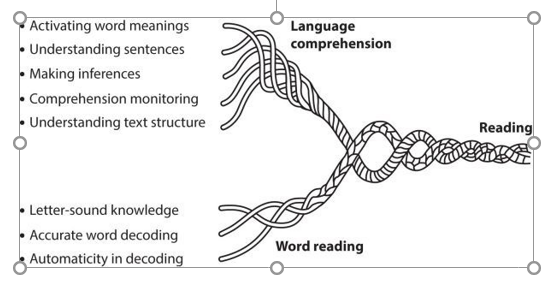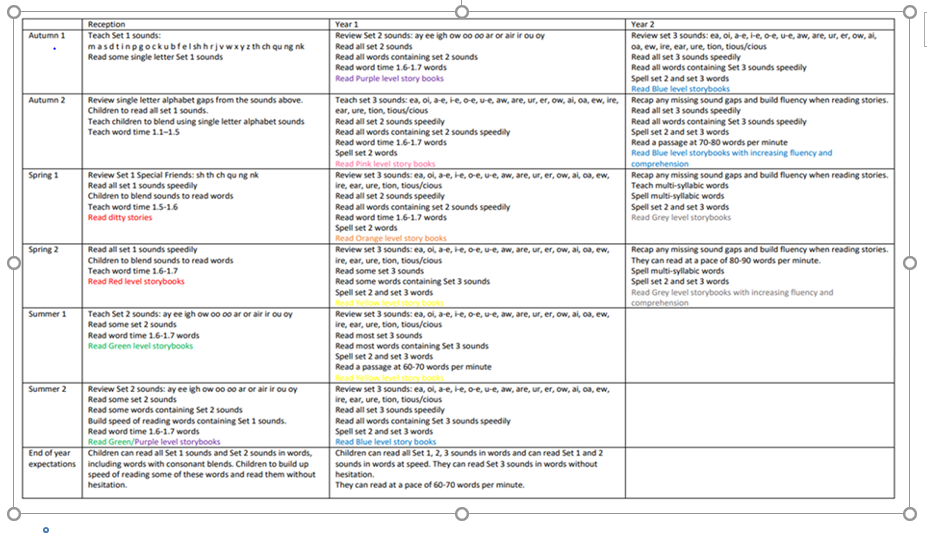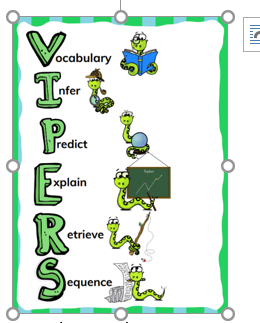Reading at Pearl Hyde
“The more that you read, the more things you will know. The more things that you learn, the more places you will go.”
-Dr Seuss

Reading Intent
At Pearl Hyde, we intend to develop a lifelong love and enjoyment of reading in all children. We believe that all children should be exposed to a range of high-level, exciting texts that inspire and engage. We aim to ensure that, by the end of year 6, pupils are able to read fluently, accurately and with confidence, with an ability to comprehend and discuss what they have read. We intend to support children in applying the skills they develop across the curriculum as we believe that reading is a fundamental skill for academic and lifelong success.

Reading implementation
At Pearl Hyde, we understand that reading is complex and cognitively demanding. Therefore, we follow a research-based approach to the teaching of reading. Our curriculum is focused on two pivotal strands; word reading and comprehension. As a school, we recognise that word reading is the foundation stone of teaching reading and therefore, we ensure that we deliver a rigorous phonics programme
The systematic teaching of phonics is a high priority across the school. At Pearl Hyde, we use an accredited systematic phonics program called ‘Read, Write Inc’ alongside creative teacher planning in order to tailor lessons to individual cohorts and children. This is to teach our children how to decode, segment and blend all of which are proven to support the development of word reading. When children are fluent, based on standardised assessment from the RWI programme, we transition them to whole-class Guided Reading. This approach focuses on teaching the children the fundamental comprehension skills that they need to develop as the ‘whole reader’. These skills are aligned with the National Curriculum expectations for the teaching of reading and they are matched to the content domains that are tested in the statutory assessments of KS1 and KS2. We use our Guided Reading system as well as 1-1 reading strategies to advance competency and automaticity.
| KS1 | KS2 |
| 1a draw on knowledge of vocabulary to understand texts | 1b identify/explain key aspects of fiction and non-fiction texts, such as characters, events, titles and information |
| 2c Summarise main ideas from more than one paragraph | 2b retrieve and record information / identify key details from fiction and non-fiction |
| 2h Make comparisons within the text | 1c Identify and explain the sequence of events in texts |
| 1d make inferences from the text | 2d make inferences from the text / explain and justify inferences with evidence from the text |
| 1e predict what might happen on the basis of what has been read so far | 2e predict what might happen from details stated and implied |
| 2f Identify/explain how information / narrative content is related and contributes to meaning as a whole | |
| 2g identify/explain how meaning is enhanced through the choice of words and phrases | |
| 2h make comparisons within the text |
Phonics – Read Write Inc
https://home.oxfordowl.co.uk/reading/reading-schemes-oxford-levels/read-write-inc-phonics-guide/
All children in Reception and Key Stage 1 engage in daily phonics lessons which consist of a range of speaking, listening, spelling, reading and writing activities. Teachers draw upon continuous assessment to ensure children’s current needs are met through regular reorganisation of groupings to ensure children are being supported and challenged where necessary. In some cases, children need to continue within the phonics program of study into KS2, these children are identified through assessment and bespoke, timely interventions are put in place to close the gap. The books that the children take home match the children’s phonic knowledge so that they have the chance to decode familiar and unfamiliar words. We recognise that children need to practise what they have been taught and therefore we follow the RWI Home Reading aligned curriculum.
Outlined below are defined endpoints for the RWI programme we use in school.

Guided Reading – Fred’s Teaching
At Pearl Hyde, our Guided Reading teaching is structured around the whole class’s pedagogical approach. We have adopted the FRED’s Teaching Reading Scheme, which has been adapted to meet the needs of our children. There is a rigorous pedagogical approach across the school, which ensures that each class follows a weekly sequence of learning.
Comprehension skills are pivotal in developing well-rounded readers. These skills begin in the Early Years and are developed throughout children’s time in school. We follow the key skills of Retrieval, Prediction, Vocabulary, Inference, Explanation and Summarising/sequencing, which are part of The Literacy Shed VIPERS scheme. This ensures that we teach all of the KS1 and KS2 content domains. These skills are explicitly taught through a range of techniques, building up to the independent completion of questions.

As part of our guided reading approach, reading aloud is encouraged in all Key Stages, developing from 1:1 reading with an adult to reading texts or presenting their own work to their class. Oral texts are used in writing lessons to develop an understanding of text structure and to encourage children to read aloud, often as a class or in groups. Children often take pride in adding intonation or actions to a text in order to present it to a high standard. Oracy skills are developed within all year groups. In Key Stage 1, there is a focus on oral retelling and recall skills, progressing to a focus on intonation and appropriate registers in Key Stage 2.
Impact
Children at Pearl Hyde enjoy reading and are engaged by the texts used across the curriculum. Through the teaching of phonics at Pearl Hyde, our aim is for children to become fluent word readers by the end of key stage one. Following this, through the consistent teaching of reading skills across key stage two, we hope to develop fluent readers who are confident in their comprehension skills. Children are assessed regularly through both summative and formative assessments in all key stages to ensure teaching is adapted to suit the strengths and needs of all pupils. This use of frequent assessment, supported by our approach to reading through refining skills makes it clear to teachers, which skills require recapping and strengthening through a range of approaches and activities. This enhances teaching and learning, allowing a very specific approach which meets the needs of all pupils.
We also believe that through books children can: learn new skills; understand the people around them; discover new cultures; and find new ways to solve problems and overcome obstacles within our lives, using imagination and creativity.
English Home Learning expectations
Below are the home learning expectations for all year groups. Home Learning will be sent home every Wednesday and will need to be returned to school by the following Monday. This will enable teachers the time to look at the homework and set new homework. In Reception and Key Stage 1, a CPG-targeted question book will be sent home; on the inside cover, a slip of paper will have been stuck in with the page numbers of the task that needs to be completed. In Key Stage 2, children will be set homework on Century Tech. In addition to this grammar-focused homework, every child will be sent home with their weekly spelling list, after the children have been actively taught the pattern focus for that week. This will then be assessed on Monday and the results will be recorded on a tracker system for GAP analysis.
| Year Group | Homework Expectation |
| Reception | In Year 1, the children will receive their weekly spellings, which are based on the phonemes that they have been learning. In addition to this, the children will receive their phonics reading book and a love for reading book, which they must read at home. The children will be enrolled on the RWI eBook system. The children will be expected to complete 1 book per week and the matching quiz. |
| Year 1 | The children will receive their weekly spellings, which are based on the statutory spelling list and patterns for their age and stage. They must complete one nugget from Century Tech. The children will be enrolled on the Oxford Reading Buddy system. The children will be expected to complete 1 book per week and the matching quiz. They will also have their love for reading book, which will need to be read to them weekly. |
| Year 2 | In Year 2, the children will receive their weekly spellings, which are based on the phonemes that they have been learning. In addition to this, the children will receive their phonics reading book and a love for reading book, which they must read at home and they must complete one page from CPG Targeted Questions Year 2 book weekly. The children will be enrolled on the RWI eBook system. The children will be expected to complete 1 book per week and the matching quiz. After Spring 1 – the children will be enrolled on the Oxford Reading Buddy system. The children will be expected to complete 1 book per week and the matching quiz. They will also have their love for reading books, which will need to be read to them weekly. |
| Year 3 | The children will receive their weekly spellings, which are based on the statutory spelling list and patterns for their age and stage. They must complete one nugget from Century Tech. The children will be enrolled on the Oxford Reading Buddy system. The children will be expected to complete 1 book per week and the matching quiz. They will also have their love for reading book, which will need to be read to them weekly. |
| Year 4 | The children will receive their weekly spellings, which are based on the statutory spelling list and patterns for their age and stage. They must complete one nugget from Century Tech. The children will be enrolled on the Oxford Reading Buddy system. The children will be expected to complete 1 book per week and the matching quiz. They will also have their love for reading book, which will need to be read to them weekly. |
| Year 5 | The children will receive their weekly spellings, which are based on the statutory spelling list and patterns for their age and stage. They must complete one nugget from Century Tech. The children will be enrolled on the Oxford Reading Buddy system. The children will be expected to complete 1 book per week and the matching quiz. They will also have their love for reading books, which will need to be read to them weekly. |
| Year 6 | The children will receive their weekly spellings, which are based on the statutory spelling list and patterns for their age and stage. They must complete one nugget from Century Tech. The children will be enrolled on the Oxford Reading Buddy system. The children will be expected to complete 1 book per week and the matching quiz. They will also have their love for reading books, which will need to be read to them weekly. |
Additional homework may be set by your child’s class teachers to support or enrich their learning.
